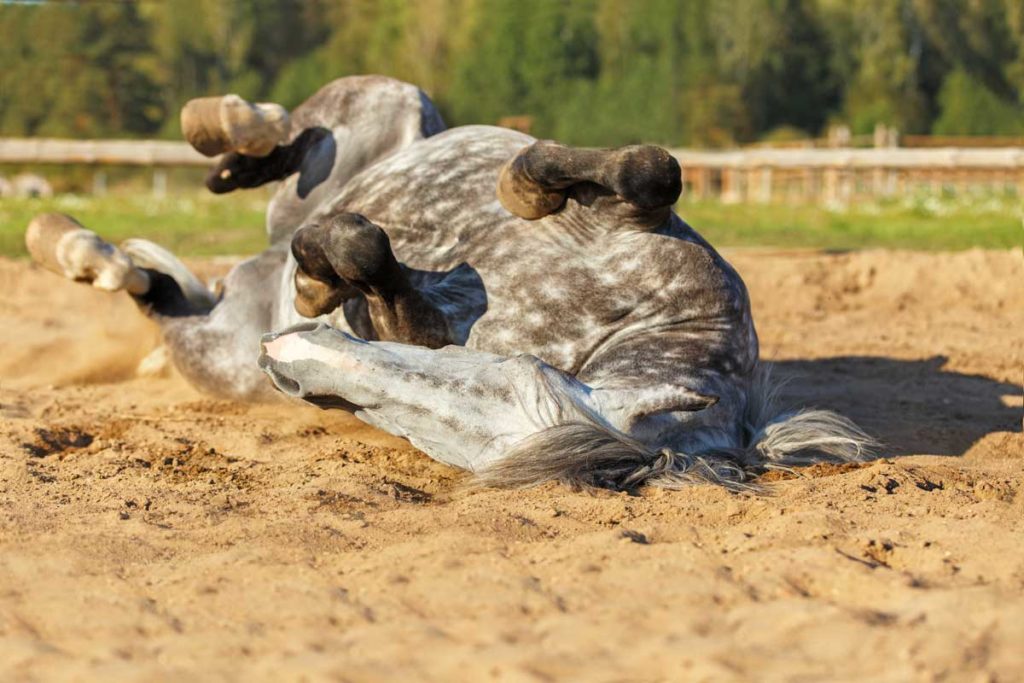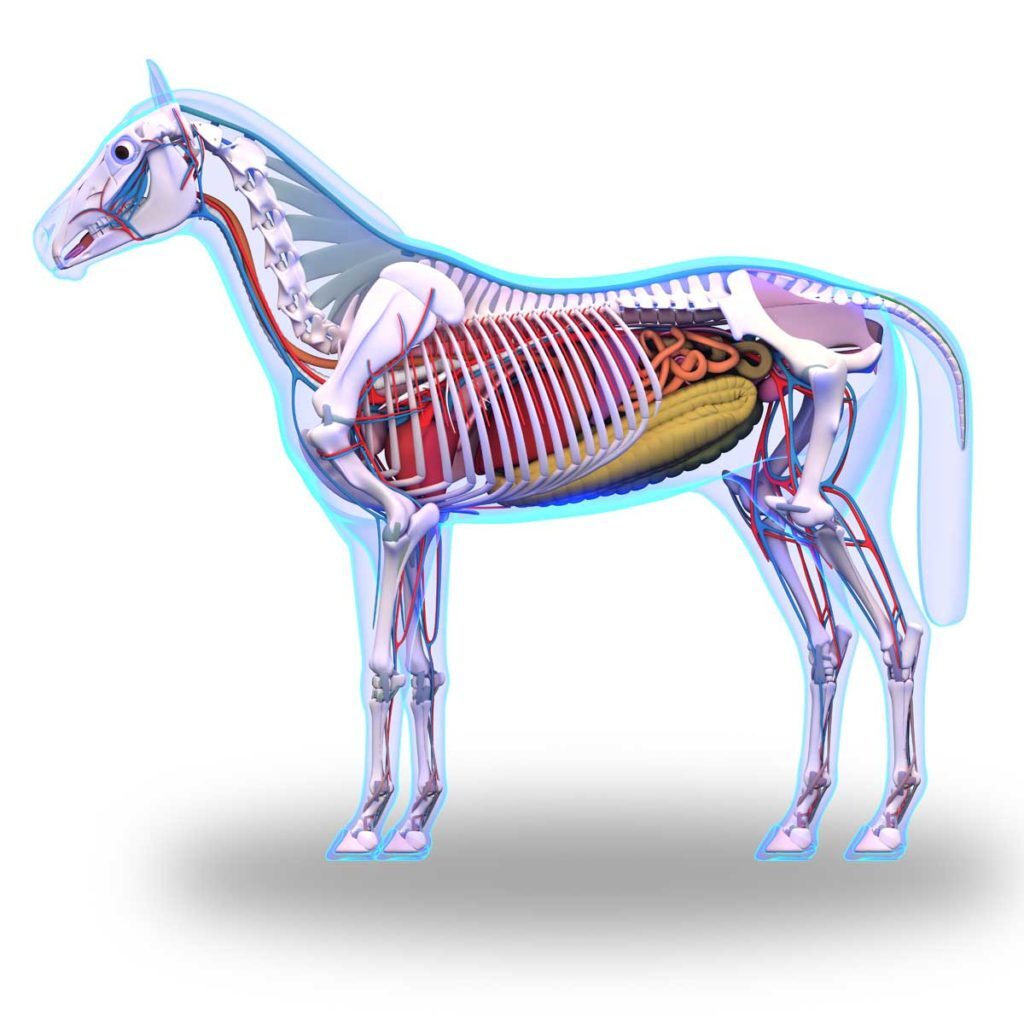No products in the cart.
Horse Health
That Gut Feeling – Maintaining Digestive Health in Horses
Horses have a unique digestive system which has evolved for many years to digest a constant supply of low starch, fibrous feed. But domestication and modern horse management mean that horses are sometimes fed diets that their digestive system is not well adapted for. Unfortunately, a less than natural feeding regime, coupled with the stress of competing and changes in routine or management can often result in digestive upset, including colic and Gastric Ulceration.
Good digestive health is pivotal to your horse’s health and performance so it’s important to ensure you are supporting this with the right diet and management. Follow these guidelines to discover the basics of good digestive health, how and why digestive issues occur and what you can do to help prevent and relieve them:
Equine Digestive Health – the basics
Horses are browsing herbivores, typically spending 16-18 hours a day moving and eating a variety of vegetation which flows through the digestive tract in a slow constant trickle. With a small stomach and a large hindgut devoted to digesting a continual supply of fibre, they are essentially a ‘hindgut fermenter’ and their digestive system reflects this. Within the hindgut, billions of microbes thrive on digesting a constant supply of fibre through fermentation, which keeps them happy and healthy, promoting a healthy hindgut. Digestive health in horses is, therefore, dependent on feeding in sympathy with their digestive system and microbial population.
However, many horses can have a diet and management routine far removed from this, which can pose significant challenges to the digestive tract. Additionally, the stress associated with restricted turnout, isolation, travelling, unfamiliar surroundings and training can all significantly affect digestive health, resulting in problems that will have a significant impact on your horse’s health and wellbeing.
Digestive illness and upset in horses
Stress caused by training, environmental or social factors can initiate a physical response leading to deteriorating gut health. Stress is a major cause of gastric ulcers, which in turn are a major cause of poor health and wellbeing. A horse struggling with poor digestive health may lack adequate nutrition and energy, which will then have an impact on their overall health and condition.
Diets low in fibre and high in starch have a serious impact on digestive health and are a major factor in the development of gastric ulcers. In addition to gastric problems, the hindgut is a serious contender in health and performance issues. The health of the hindgut depends on a delicate balance between beneficial fibre digesting bacteria and more harmful bacteria which can easily change. Poorly digested high starch diets can lead to a proliferation of less desirable bacteria who produce lactic acid, and a reduction in beneficial bacteria. Additionally, as the starch and sugar are rapidly fermented, excess gas is produced within your horse’s hindgut causing flatulence and bloating and can lead to certain types of colic. As a result of the microbial imbalance or ‘dysbiosis’, diarrhoea can also occur and the hindgut becomes far more acidic, leading to a condition called ‘hindgut acidosis’, resulting in inflammation The acidosis also causes more beneficial bacteria to die off, producing toxins which can damage the gut lining and cause ulcers. All of this will make the hindgut sore and uncomfortable, which can result in horses going off their food (inappetence) and impact your horse’s temperament, and performance. Just as you or I would be unhappy and wouldn’t be able to work well with a painful tummy, it is exactly the same for your horse.
Tips to optimise your horse’s digestive health
Whilst there are good veterinary treatments for digestive issues like ulcers, a treatment-based approach, maintaining horses on daily long-term medication is not ideal as it can lead to drug induced nutritional deficiencies such as B12 deficiency. Instead a preventative approach to promote good digestive health alongside using targeted homeopathy to help relieve the symptoms of digestive upset when needed is generally better:
- Feed plenty of fibre
Fibre is absolutely essential for a healthy digestive system to help beneficial microbes to thrive, so try and ensure your horse is getting ad-lib forage at all times. Good-quality forage that is well digested can provide levels of energy high enough to support harder work. Consider sources of highly digestible, soluble fibre to provide an additional energy boost when needed, instead of relying on large volumes of cereals. Soluble fibres like mucilage, present in linseed meal, are thought to have a soothing protective effect on the gut lining to benefit digestive health, whilst providing an excellent food source for beneficial bacteria.
- Reduce Stress
Ensure your horse is getting at least 12 hours turnout per day, ideally out 24/7, where they can move about, browse and socialise with other horses, all of which are important to help reduce stress and its effects on digestive health.
Make sure your horse is fully fit and capable of the work you are asking, to help reduce both mental and physical stress. Getting your horse out and about as much as possible will help them get used to both travelling and going to various places so this will become far less stressful if competing or trail riding in different locations.
For stressful occasions such as competition or travel, your horse may benefit from a little extra help to remain calm and to minimise stress. EquioPathics Pre-Performance Stress and EquioPathics Travel Anxiety are two natural, competition-legal medicines that can help support your horse at times of stress. EquioPathics Pre-Performance Stress promotes relief from fear of performing, change of stables or environment, the introduction of new animals and other stressful situations causing signs of anxiety or fear to be exhibited, while EquioPathics Travel Anxiety promotes relief from fear of travel, loading, trail riding and other stressful situations.
- Support hindgut microbes
Prebiotics can help promote digestive health by providing a feed source for beneficial hindgut bacteria. Prebiotics have been scientifically proven in horses to not only promote optimum fibre digestibility but also to help nurture and stimulate the growth of beneficial bacteria.
- Relieve Discomfort
EquioPathics Digestive Upsets formula can help provide temporary relief of common symptoms related to digestive upset such as diarrhoea, flatulence and bloating. EquioPathics Digestive Upsets is competition-legal and can be given strategically whenever your horse is showing signs of digestive upset to help them feel more comfortable and support good recovery.






